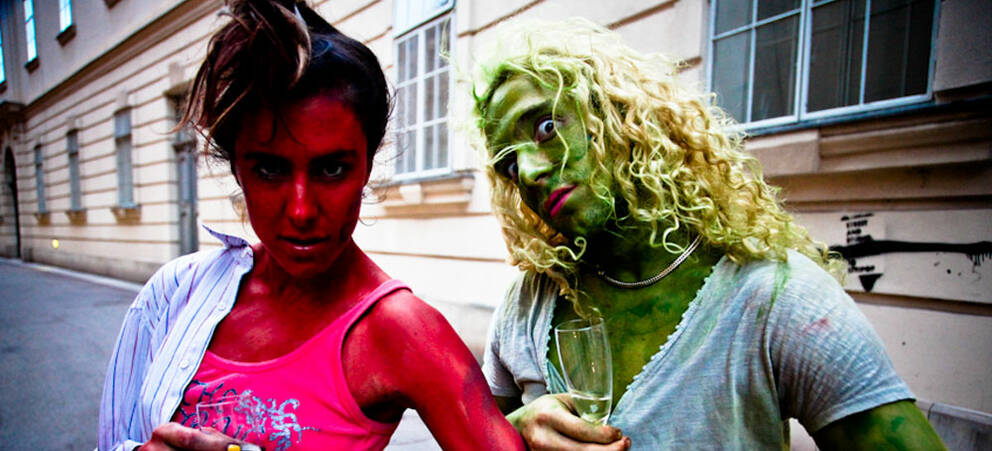
Wild Card residency for Claire Vivianne Sobottke
Berlin based choreographer and performer, Claire Vivianne Sobottke was in Station’s residency program Station One from 1st till 14th April 2018, through an exchange with Ufer Studios, Berlin.
During her residency at Station, Belgrade, Claire set the beginnings for her new project 'disruptive femininities' (working title), that will be premiered in 2019 in Berlin. Using the format of the portrait as a way to create choreogaphy, she set out to create a dreamscape for the embodiments of the feminine. This by seeking a genuine and intimate expression of the feminine perspective and feminine identities, but also by making use and playing with the categorizations, assumptions and archetypes falling onto the female body. By exaggerating, dancing through, - and playing with the imaginations and phantasies projected onto the female body, a dangerous subject is created: A subject that remains transformable and that refuses all kinds of categorization.
The portrait, as an artistic form, becomes in her reserach not only a hybrid connecting the real and the representation, the abstract and the recognizable, but also a document of solitude as such. She defines solitude as a place, where the individual is thrown back on the singularity of its body and its strange phenomena, such as sweat, affect or tears. Simultanouesly this solitude opens a space where phantasies and affects can be lived without any social restraints: A vast terrain to let the the fictional self wander and dance through different shapes and hybrid identities.
Excerpt from her report:
„Working in Magacin couldn't have been more different. Working in Magacin meant to work in a space that literally and totally belongs to the people. There is a difference in working in artspaces that really belong to everyone and that are equally available to everyone, and to work in artspaces that claim to represent everyone and sometimes use the representation of minorities, as a kind of publicity or economic machine, but remain quite hierarchical in their structures. I think working in spaces that really belong to everyone means to stretch usual ideas of hierarchy. Sometimes this can be quite uncomfortable. It asks for the appreciation of chaos, the acceptance of difference and sometimes for a temporary loss of privacy. When I arrived first in the studio, a group of acrobats was working there, it was fun , smelly , chaotic.. I learned that the space is self - organized, that there are hide - outs for keys, that the schedule for the space is agreed upon through an open google
document and that there is a common coffee machine in the office. So when the door is open, people walk in to have a coffee. I learned that Magacin is the only common space for dance in Belgrade, and that Stanica is a loving and raging mother: An organization deeply involved in fighting for the rights of dancers and artists, but then also constantly trying to open a discussion on what dance is or could be, what research might mean, how people can really exchange, share knowledge and resources in capitalist times, and how to understand movement and theory, art and politics as one body. A body with many limbs, organs and a complex psyche. I learned that the conditions for dancers are harsh , that the funding system is corrupt and that production - money is little.
The consequence of these political situations and limitations are immediately perceivable in a space: For example it means that in Stanica there is no dance sprung – floor. But it also means that people will try to make one. By collecting the old tires of cars and by then putting wood over it. It means that there is no central heating, but different hot blowing machines, some more silent then others . Or that there is no mixer but for sure one can be and will be found in the city. Limitations mean, that a solution will be found. Limitations also mean that it is sometimes enough to work with what is already there. That what you carry with you is already a world…. For sure one of the most important things in my residency in Belgrade was the openness with which I was introduced and welcomed into the community. It mattered a lot to be able to speak and to also plan together with You and with Ksenjia, to share doubts and ideas about the work itself and about the open showing. To have a curious friend. It mattered to be given trust and to understand that there would be the support to do whatever might be right for me. I realized that the network is very strong and that people who have to meet will be brought together. It is like this that i met the wonderful Zoe and how I got into a conversation with Ana, who was dealing with similar questions as me. When we were talking about Belgrade, You mentioned once, that Belgrade and the dance from Serbia is often not really a part of a market and that this is also a privilege. That it creates a different relation to concurrence and also to content. That works are maybe less made already with
the ambition to create a 'successful' product, but rather with the intention to figure something out.
That people support each other and create organizations to make things happen. That people discuss. I felt that being a guest in this culture really means something, that it was a very personal encounter and an honest interest to meet….”
01.04.18 - 14.04.17
Belgrade (RS)
